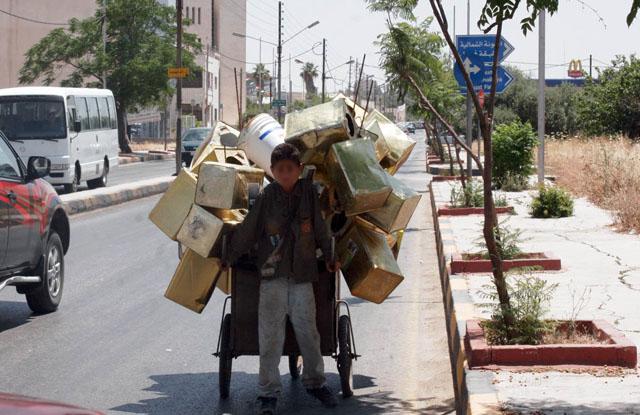You are here
‘Significant’ number of Irbid families rely on income from children, study finds
By Mays Ibrahim Mustafa - Jul 05,2023 - Last updated at Jul 05,2023
AMMAN — A local study recently revealed that a significant number of families in Irbid rely on the income of their working children.
The study was conducted in 2022 by the Family and Childhood Protection Society in Irbid. It included a sample of 1,000 children working in the governorate, 650 of whom are Jordanians and 350 are Syrians.
In 25 per cent of cases, families relied on the work of their children as a main source of income, and in 30 per cent of cases, both the children and the father were responsible for financially supporting the family, according to the study’s findings.
Its report stated that 56 per cent of families included in the study are made up of five to eight members, 8 per cent live in houses with two or three rooms, and over a third have members suffering from chronic diseases.
It also showed that 50 per cent of these families receive a monthly income ranging from JD50 to JD100 and live in rented houses. A quarter of the families receive monthly assistance worth JD50.
Moreover, 70 per cent of children represented in the study work on a full-time basis, while 40 per cent work and attend school.
The majority of the children are between the ages of six and 16, and they often work in “difficult and hazardous” settings such as mechanic workshops, according to the study.
The study also noted an increase in child abuse cases in the workplace, where violent measures are taken to force children to work, or as a punishment.
Child labour can lead victims to develop problematic social behaviours, such as aggression, smoking and drug abuse, in addition to depriving children of their right to education in many cases, the study said.
The study also identified the Syrian refugee crisis as a factor which contributed to a “considerable” increase in child labour cases in Irbid, which is currently facing high unemployment rates.
The tough economic situation is also a contributing factor in this increase. “Families’ monthly income is no longer enough to meet their needs amidst a continuous rise in living costs,” the study added.
In a statement sent to The Jordan Times, president of Family and Childhood Protection Society, Kathem Al Kufairy, noted that the rise in unemployment levels in Irbid caused in part by mass lay-offs following the outbreak of the COVID-19 pandemic, has pushed many families to send their children into the workforce.
Hiring children makes it easier for employers to pay workers salaries below the minimum wage and avoid legal labour obligations, such as paying social security subscriptions, he added.
Many children are “exploited” by being forced to work for over 10 hours per day for low wages, less than JD3 per day, without proper meals or break periods, Kufairy said.
Many children in Irbid work as porters in local markets, which makes them vulnerable to various health risks due to the long duration sun exposure and the physically demanding nature of the job, the statement said.
Related Articles
AMMAN — Eliminating child labour requires a comprehensive approach that addresses its root causes by tackling poverty and increasing childre
Child labourers in urban environments earn between JD3 and JD5 per day and are mainly found working on the street, in shops and in restaurants, according to a report released on Monday.
AMMAN — Child labour is becoming “increasingly common” in Jordan, especially among refugees whose children join the labour market to help th



















